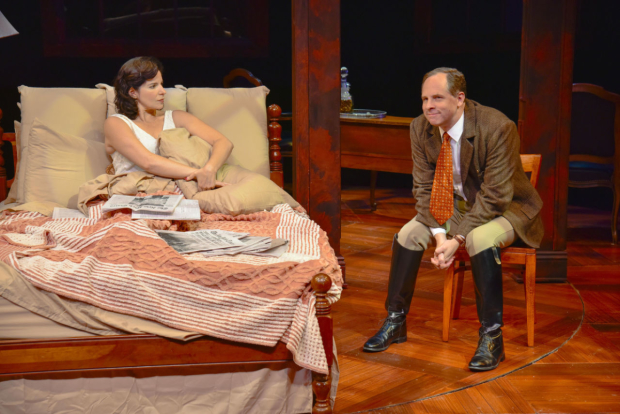Broken Glass
In honor of Arthur Miller’s 100th birthday, a late work by the playwright receives a Boston premiere.

(© Andrew Brilliant)
As part of a national celebration of Arthur Miller’s centenary, New Repertory Theatre has boldly chosen the road less traveled by opening its season with one of Miller’s mostly forgotten later works, Broken Glass, which is also making its Boston area debut. The play opened on Broadway in 1994 to mixed reviews and shuttered after only 73 performances. That it has taken two decades for a Boston production is surprising only until one has actually sat through the play, but under the direction of Jim Petosa, Broken Glass is notable chiefly for its pointedly salient performances.
It is November 1938 in Brooklyn, and Sylvia Gellburg (Anne Gottlieb), suddenly paralyzed, loses the ability to walk. Her adoring husband, Phillip (Jeremiah Kissel), works tirelessly with Dr. Harry Hyman (Benjamin Evett) to get to the bottom of this medical mystery. Her sudden immobilization occurs just after Kristallnacht, otherwise known as the Night of Broken Glass, a pogrom against Jews throughout Nazi Germany and Austria that left shards of broken glass all over the streets after the windows of Jewish synagogues, buildings, and shops were smashed. Sylvia has become obsessed with all of the news coming out of Germany, and her sickbed is littered with all of the latest newspapers.
Dr. Hyman becomes devotedly interested in Sylvia and her case, and there’s more than a little bit of sexual tension between the two of them. While he’s a notorious playboy, in him Sylvia finds some hope of getting free from her droll life. While her ailments are psychosomatic, the cause is something much deeper – and more personal – than the atrocities happening overseas. Phillip, who hasn’t been intimate with his wife in over 20 years, has never felt good enough for her. He loves her, but begins to wonder if he’s not the cause of her paralysis. He feels inferior in every way possible: He resents his Jewishness, still thinks it’s a miracle that his wife chose him, and is himself paralyzed by his own guilt over his wife’s unhappiness.
While Miller’s densely worded, anxious dialogue makes grueling demands of the audience, it provides the actors with sensationally complex material with which to distill their performances, and these performances are what make Broken Glass memorable. The role of Phillip is monstrously difficult, and Kissel is so arresting you can’t take your eyes off of him, even after the character becomes exhaustingly redundant and whiny. The same character flaws are present in his wife, Sylvia, though Gottlieb is similarly excellent. Evett’s Dr. Hyman is assured, as is the splendid Eve Passeltiner as his wife, Margaret. As Harriet, Sylvia’s supportive but realistic sister, Christine Hamel is understated and powerful. Stanton Case, Phillip’s rigid and anti-Semitic employer, is played by the superb Michael Kaye.
Petosa has mounted a production that painstakingly adheres to Miller’s detail-heavy script, though he must be commended for keeping things moving at a palatably swift pace. Designer Jon Savage’s handsomely well-worn set employs a turntable, just as the original Broadway production did, to keep the action moving circuitously between the Gellburg residence and the offices of Dr. Hyman and Stanton Case. The visualization of the stage and its furniture swirling between scenes is like a brewing hurricane, with Syliva and Phillip’s bed at the eye of the storm. Scott Pinkney’s lighting is equally effective; five giant windows are stationary high above the stage, and despite some scenes occurring during the day, we never see a single glimpse of sun shine through those windows, a chilling visualization of the bleakness of both the play and its characters.
The title Broken Glass also serves as a reference to the bookends of the Gellburg’s fractured relationship: the napkin-wrapped glass that is stepped on by the groom at a traditional Jewish wedding juxtaposed with, perhaps, the aftermath of a domestic dispute. But it is also about how transparency, of people and of circumstances, can cause deep fissures — and about how, only once the ground is littered with shards of individual pieces, the mending can begin.









